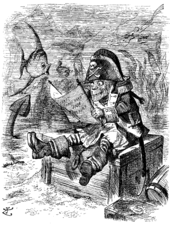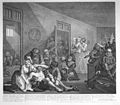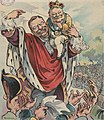Portal:Cartoon
The Cartoon Portal

A cartoon is a type of visual art that is typically drawn, frequently animated, in an unrealistic or semi-realistic style. The specific meaning has evolved, but the modern usage usually refers to either: an image or series of images intended for satire, caricature, or humor; or a motion picture that relies on a sequence of illustrations for its animation. Someone who creates cartoons in the first sense is called a cartoonist, and in the second sense they are usually called an animator.
The concept originated in the Middle Ages, and first described a preparatory drawing for a piece of art, such as a painting, fresco, tapestry, or stained glass window. In the 19th century, beginning in Punch magazine in 1843, cartoon came to refer – ironically at first – to humorous artworks in magazines and newspapers. Then it also was used for political cartoons and comic strips. When the medium developed, in the early 20th century, it began to refer to animated films that resembled print cartoons. (Full article...)

In print media, a cartoon is a drawing or series of drawings, usually humorous in intent. This usage dates from

Selected article -
Sam & Max is a media franchise focusing on the fictional characters of Sam and Max, the Freelance Police. The characters, who occupy a universe that parodies American popular culture, were created by Steve Purcell in his youth, and later debuted in a 1987 comic book series. The characters have since been the subject of a graphic adventure video game developed by LucasArts, a television series produced for Fox in cooperation with Nelvana Limited, and a series of episodic adventure games developed by Telltale Games. In addition, a variety of machinima and a webcomic have been produced for the series. The characters are a pair of anthropomorphic, vigilante private investigators based in a dilapidated office block in New York City. Sam is a calculative six-foot dog wearing a suit and a fedora, while Max is a short and aggressive "hyperkinetic rabbity thing". Both enjoy solving problems and cases as maniacally as possible, often with complete disregard for the law. Driving a seemingly indestructible black-and-white 1960 DeSoto Adventurer, the pair travel to many contemporary and historical locations to fight crime, including the Moon, Ancient Egypt, the White House and the Philippines, as well as several fictitious locations. The series has been very successful despite its relatively limited amount of media and has gathered a significant fan base. However, the franchise did not gain more widespread recognition until after the 1993 release of LucasArts' Sam & Max Hit the Road, which cultivated interest in Purcell's original comics. Sam & Max Hit the Road is regarded as an exceptional adventure game and an iconic classic of computer gaming in the 1990s. Subsequent video games and the television series have also fared well with both critics and fans; critics consider the episodic video games to be the first successful application of the episodic distribution model.
Selected character -
Bart Simpson is a fictional main character in the animated television series The Simpsons and part of the eponymous family. He is voiced by actress Nancy Cartwright and first appeared on television in The Tracey Ullman Show short "Good Night" on April 19, 1987. Bart was created and designed by cartoonist Matt Groening while he was waiting in the lobby of James L. Brooks' office. While the rest of the characters were named after Groening's family members, Bart's name was an anagram of the word brat. After appearing on The Tracey Ullman Show for three years, the Simpson family received their own series on Fox, which debuted December 17, 1989. He has appeared in other media relating to The Simpsons; including video games, The Simpsons Movie, The Simpsons Ride, commercials, and comic books; and inspired an entire line of merchandise. Hallmarks of the character include his chalkboard gags in the opening sequence; his prank calls to Moe the bartender; and his catchphrases "Eat my shorts", "¡Ay, caramba!", and "Don't have a cow, man!" Nancy Cartwright has won several awards for voicing Bart, including a Primetime Emmy Award in 1992 and an Annie Award in 1995. In 2000, Bart, along with the rest of his family, was awarded a star on the Hollywood Walk of Fame.
Did you know... -
- ...that the film Green Lantern starring Ryan Reynolds has been in development since the 1990s and once included a comedic incarnation with Jack Black set to star?
- ...that the Young Justice episode "Independence Day" introduces a younger version of the DC Universe?
- ...that Uri-On, created by Michael Netzer in 1987, was the first Israeli superhero to be published in color?
- ...that Sozin's Comet: The Final Battle, the two-hour finale for Avatar: The Last Airbender, was the most-watched cable television broadcast in the week of its transmission?
Selected list -
The episodes of The Simpsons, an American animated sitcom, created by Matt Groening (pictured) for the Fox Broadcasting Company. The series is a satirical parody of a middle class American lifestyle epitomized by its eponymous family, which consists of Homer, Marge, Bart, Lisa, and Maggie. The show is set in the fictional town of Springfield, and lampoons American culture, society and television, and many aspects of the human condition. Groening created a dysfunctional family and named the characters after members of his own family, substituting Bart for his own name. Since its debut on December 17, 1989, The Simpsons has broadcast 766 episodes. The Simpsons holds several American television longevity records. It is the longest-running prime time animated series and longest-running sitcom in the United States. The series has surpassed Gunsmoke in seasons to claim the spot as the longest-running American prime-time scripted television series.
General images -
Selected biography -
Walter Elias "Walt" Disney (December 5, 1901 – December 15, 1966) was an American film producer, director, screenwriter, voice actor, animator, entrepreneur, entertainer, international icon and philanthropist. Disney is famous for his influence in the field of entertainment during the 20th century. As the co-founder (with his brother Roy O. Disney) of Walt Disney Productions, Disney became one of the best-known motion picture producers in the world. The corporation he co-founded, now known as The Walt Disney Company, today has annual revenues of approximately U.S. $35 billion. Disney is particularly noted for being a film producer and a popular showman, as well as an innovator in animation and theme park design. He and his staff created a number of the world's most famous fictional characters including Mickey Mouse, a character for which Disney himself was the original voice. He has won 26 Academy Awards out of 59 nominations, including a record four in one year, giving him more awards and nominations than any other individual. He also won seven Emmy Awards. He is the namesake for Disneyland and Walt Disney World Resort theme parks in the United States, as well as the international resorts in Japan, France, and China. Disney died of lung cancer in Burbank, California, on December 15, 1966.
Subcategories
WikiProjects
- Main projects
- Arts • Animation • Comics • Entertainment • Visual arts
- Related Projects
- Anime and manga • Biography • Film • Fictional characters • Media franchises • Music • Television • Video games
Selected quote -
Topics
- Comic book
- Comic strip
- Digital comics
- Graphic novel
- Mobile comic
- Motion comics
- Trade paperback
- Webcomic
- Animator
- Animation director
- Animation studios
- Animation film festivals
- Feature-length films
- Short films
- Television series
- Computer-animated films
- Stop-motion films
- Traditional animation
- Limited animation
- Rotoscoping
- Stop Motion
- Clay
- Cutout
- Graphic
- Model
- Object
- Pixilation
- Puppetoon
- Computer animation
- Flash animation
- PowerPoint animation
- SVG animation
- Cel-shaded animation
- Crowd simulation
- Morph target animation
- Motion capture
- Non-photorealistic rendering
- Skeletal animation
Things you can do

- Requested articles: Fenwick (comics), Khimaera (comics), Mutant Underground Support Engine, Bruce J. Hawker, Marc Dacier, Hultrasson, Frankenstein Comics, Dave Johnson (comics), Paco Medina, Dappere Dodo, New Adventures of the Space Explorers, Habatales, Musical Box, Foo-Foo (TV series), Bonne nuit les petits, The Adventures of Lariat Sam, More...
- Images and photos needed: Request images that are needed from Wikipedia requested images of comics and animation to included in each articles.
- Stubs: Work on stubs in articles in Comics and Animation stubs.
- Infobox: Add infobox that are needed from Category:Comics articles without infoboxes and Category:Animation articles needing infoboxes in articles.
- Deletion sorting: Please see the collection of discussions on the deletion of articles related to comics and animation - compiled by WikiProject Deletion sorting
Related portals
Associated Wikimedia
The following Wikimedia Foundation sister projects provide more on this subject:
-
Commons
Free media repository -
Wikibooks
Free textbooks and manuals -
Wikidata
Free knowledge base -
Wikinews
Free-content news -
Wikiquote
Collection of quotations -
Wikisource
Free-content library -
Wikiversity
Free learning tools -
Wiktionary
Dictionary and thesaurus










































